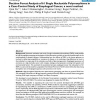Free Online Productivity Tools
i2Speak
i2Symbol
i2OCR
iTex2Img
iWeb2Print
iWeb2Shot
i2Type
iPdf2Split
iPdf2Merge
i2Bopomofo
i2Arabic
i2Style
i2Image
i2PDF
iLatex2Rtf
Sci2ools
BMCBI
2005
2005
Decision Forest Analysis of 61 Single Nucleotide Polymorphisms in a Case-Control Study of Esophageal Cancer; a novel method
Background: Systematic evaluation and study of single nucleotide polymorphisms (SNPs) made possible by high throughput genotyping technologies and bioinformatics promises to provide breakthroughs in the understanding of complex diseases. Understanding how the millions of SNPs in the human genome are involved in conferring susceptibility or resistance to disease, or in rendering a drug efficacious or toxic in the individual is a major goal of the relatively new fields of pharmacogenomics. Esophageal squamous cell carcinoma is a high-mortality cancer with complex etiology and progression involving both genetic and environmental factors. We examined the association between esophageal cancer risk and patterns of 61 SNPs in a case-control study for a population from Shanxi Province in North Central China that has among the highest rates of esophageal squamous cell carcinoma in the world. Methods: High-throughput Masscode mass spectrometry genotyping was done on genomic DNA from 574 individ...
| Added | 15 Dec 2010 |
| Updated | 15 Dec 2010 |
| Type | Journal |
| Year | 2005 |
| Where | BMCBI |
| Authors | Qian Xie, Luke D. Ratnasinghe, Huixiao Hong, Roger Perkins, Ze-Zhong Tang, Nan Hu, Philip R. Taylor, Weida Tong |
Comments (0)

